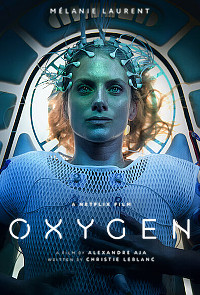| SHADOWS ON THE WALL | REVIEWS | NEWS | FESTIVAL | AWARDS | Q&A | ABOUT | TALKBACK | |||||||||||||||||||||
 Shadows off the beaten path Shadows off the beaten pathIndies, foreign, docs and shorts...
On this page:
CHARLATAN |
OXYGEN |
SERVANTS
| |||||||||||||||||||||
| See also: SHADOWS FILM FESTIVAL | Last update 12.May.21 | |||||||||||||||||||||
|
Charlatan Review by Rich Cline | 
| |||||||||||||||||||||
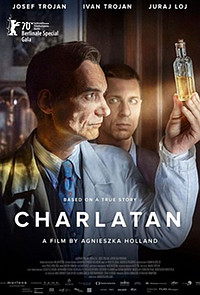 dir Agnieszka Holland scr Marek Epstein prd Sarka Cimbalova, Kevan Van Thompson with Ivan Trojan, Juraj Loj, Josef Trojan, Jaroslava Pokorna, Jiri Cerny, Miroslav Hanus, Bernhard Schutz, Igor Bares, Melika Yildiz, Frantisek Trojan, Martin Mysicka, Jana Kvantikova release Cz 20.Aug.20, US Oct.20 mvff, UK 7.May.21 20/Czech Republic 1h58 BERLIN FILM FEST Is it streaming? |
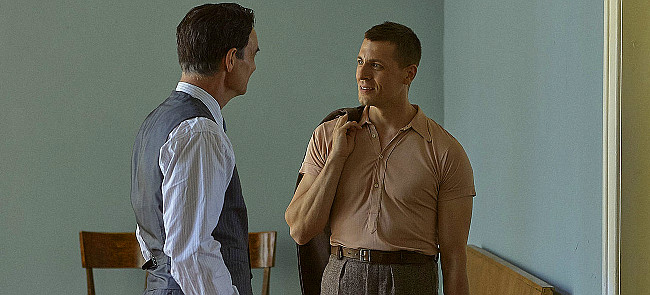 Loosely based on a true story, this well-crafted drama from veteran filmmaker Agnieszka Holland recounts intriguing events from 1950s Prague, intercut with scenes 30 years earlier. The parallel narrative isn't always smooth, but the themes engage interest as the plot intertwines with major events in Central European history, including WWII and the long road to LGBT+ equality. And it also raises provocative questions about the dismissal of traditional medicine. A successful healer, Jan Mikolasek (Ivan Trojan) uses his intuition to diagnose and treat patients with plant-based remedies and advice about diets and lifestyle. Now retirement age, his assistant Frantisek (Loj) suggests he step back to avoid criticism of his old-world methods. Indeed, the Communist post-war Czech government is seeking to discredit him, raiding his clinic and taking Jan and Frantisek in for interrogation, spuriously accused of killing two patients. His young lawyer (Cerny) begins to understand that there are other issues at work here, and the trial takes a couple of big twists. This story is interwoven with colourfully lit flashbacks of a younger Jan (initially played by Ivan's son Josef), a florist who becomes fascinated by the healing powers of plants. He asks locally revered herbalist Muhlbacherova (Pokorna) to teach him to read a patient's urine and treat them. In 1935 he meets Frantizek, and their reluctant attraction leads to a passionate romance that they have to hide from everyone. Then Nazi occupation brings further challenges and ramifications. The excellent cast delivers pulsating performances that reflect the film's edgy pacing and production design. Ivan Trojan is excellent as a man of faith who knows the limits of his seemingly miraculous abilities. As the younger Jan, Josef Trojan has the same steely resolve, with added youthful ambition as he begins to understand obstacles he'll face. And Loj has terrific physicality as Frantisek, generating strong chemistry that makes the central relationship feel complex and real. When Jan and Frantisek's (apparently fictional) love story emerges about halfway in, the film smoothly shifts direction to take in both social bigotry and Jan's literally crippling guilt. Their relationship is tender and pointed, strained by the fact that both must have wives to maintain respectability. The script never directly comments on this, and it never questions whether Jan might have been a fraud, but big ideas echo in this story of a man who was a suspect simply because he refused play by imposed modern rules. And the concluding moments are powerfully moving.
| ||||||||||||||||||||
|
Oxygen Oxygène Review by Rich Cline | 
Is it streaming?
| 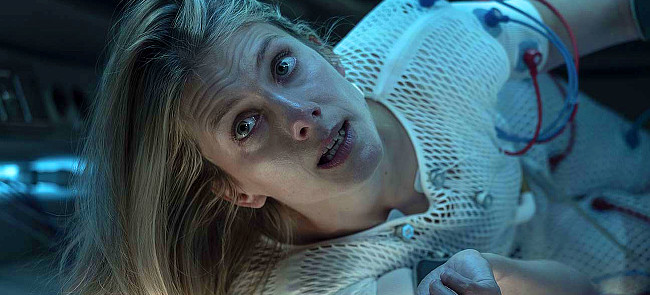 A high-concept thriller from French filmmaker Alexandre Aja, this contained drama centres on a woman trapped inside a claustrophobic container. It's superbly designed and shot to put the viewer into this cramped space, and Melanie Laurent plays the role with vivid emotionality that pulls us in further. It's over-ambitious, contrived and also strangely simplistic, but it catches the imagination and takes us on an engaging, sometimes harrowing ride. Restrained by straps and encased in netting, Liz (Laurent) wakes up gasping for air inside a cryogenic chamber. Interactive computer MILO (Amalric) reports a system failure, and oxygen levels are falling. Her cries for help go unanswered, while MILO is unable to tell her who she is or how she got there, but can connect her to the internet as well as by telephone with emergency services and police Captain Moreau (Herson Macarel). But as time runs out, a rescue is looking increasingly unlikely. And it begins to look like something else is happening here. Dropping a heavy hint, the film opens with images of a rat in a maze. Liz's chamber is a futuristic, super high-tech box walled with monitors and screens, but MILO can only access limited information about her and can't let her out without an authorisation code. Through her ordeal, there is a continual stream of revelations, gratuitous nastiness and jolts of terror, plus some warm moments as Liz revisits her life, including her husband (Zidi). Plus the realisation that maybe she put herself into this box. Laurent is terrific in a demanding role, digging deeply right from the start. It's a physical performance within a limited space, and Liz's tenacity in this situation is remarkable as she attempts to piece together the fragments of information in her memories or on the screen above her. But what she discovers seems naggingly unreliable, and she struggles to trust her instincts about what she sees and hears. The solid supporting cast appears either in gauzy cutaways or superbly expressive voices. There's a lovely, subtle sense that workaholic Liz is realising which things are truly important to her, namely the people who occupy her heart. But this is a thriller, so Aja uses kinetic camera trickery to keep things popping, while LeBlanc's script drops perhaps too many clues and surprises into the mix. The full revelation is both intriguing and more than a little overwrought, including a twist that ropes in some present-day relevance along with a lot of race-against-time exhilaration.
|
| Servants Služobníci Review by Rich Cline | 
| 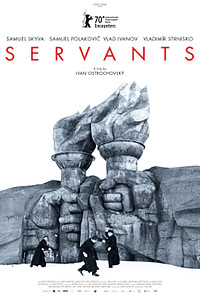 dir Ivan Ostrochovsky scr Rebecca Lenkiewicz, Marek Lescak, Ivan Ostrochovsky prd Ivan Ostrochovsky, Albert Malinovsky, Katarina Tomkova with Samuel Skyva, Samuel Polakovic, Vlad Ivanov, Vladimir Strnisko, Milan Mikulcik, Tomas Turek, Vladimir Zboron, Martin Sulik, Vladimir Obsil, Dusan Kuznecov, Zvonko Lakcevic, Peter Zalesnak release Svk Mar.20, US Dec.20 ndnf, UK 14.May.21 20/Slovakia 1h20 BERLIN FILM FEST Is it streaming?
| 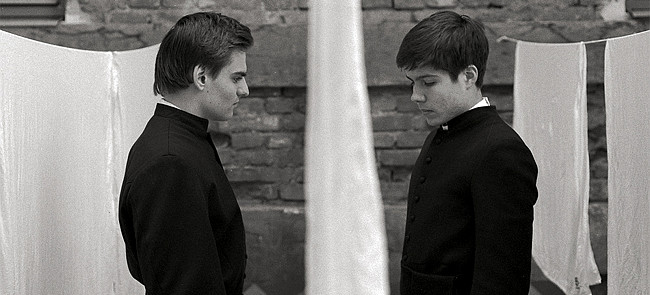 Strikingly shot in black and white, this Soviet-era drama from Slovakia has an eerily timeless quality to it. Filmmaker Ivan Ostrochovsky captures scenes in a beautiful documentary style, taking a bold approach to the pungent idea that it's easier to give in than to take a stand. The film's sometimes austere tone is cleverly maintained, offering glimpses of earthy real life that make the story darkly engaging. In 1980 Bratislava, Juraj and Michal (Skyva and Polakovic) arrive at a Catholic seminary to begin their studies. The Dean (Stmisko) is toeing the Communist government line, allowing state security operative Ivan (Ivanov) to search for dissenters among the aspiring priests. Illicitly listening to Radio Free Europe, the young students know they must decide whether they'll simply go with the flow and support the Soviets or criticise the system and face brutal consequences. And when they go on hunger strike, it becomes clear that the state is willing to take extreme action to protect itself. Cinematographer Juraj Chlpik makes each shot a formal composition, breathtaking in the way it establishes realism while elevating the imagery artistically. Alongside everyday monastic life, there are constant reminders that these students are still boys, from a spontaneous football match in a cramped courtyard to a lively snowball fight. Meanwhile, details emerge about the hooks the government has in the seminary as well as insiders who are rebelling against the regime. Dialog is minimal and hushed, because someone's probably eavesdropping. There's a deep connection between Juraj and Michal that's beautifully played by Skyva and Polakovic, almost entirely wordlessly. All conversations have to be held in secret, sharing information without comment, and they rarely get a chance to connect more personally, feeling guilty that they're keeping secrets from each other. Ivanov has a dry menace as the government stooge, and he brings a chilling energy to his scenes with Strnisko's weary Dean, whose only desire is to save the school. Many of Ostrochovsky's filmmaking touches are experimental, disclosing key information in ways that are inventive and provocative. And because so much is revealed visually, watching the movie is often mesmerising, quietly building layers of subtext along with a riveting ripple of suspense. This is a profound exploration of how totalitarian ideas rattle historical foundations, attempting to bend conflicting ideologies to their will. And while it vividly recreates a pivotal point in history, the film also has a lot to say to our post-truth era.
| 
See also: SHADOWS FILM FESTIVAL © 2021 by Rich Cline, Shadows
on the Wall
HOME | REVIEWS | NEWS | FESTIVAL | AWARDS
| Q&A | ABOUT | TALKBACK | | ||||||||||||||

